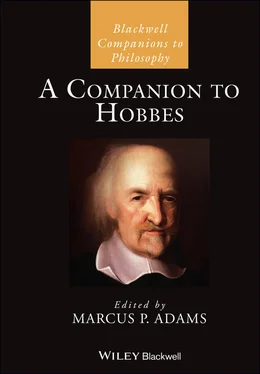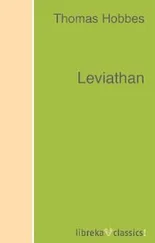Another strategy to achieve unity among the parts of Hobbes’s philosophy, without committing him to deductive or reductive unity, might examine a foundational concept in Hobbes’s thought and see how it plays varying roles within different parts of his philosophy. Given the centrality of the concept “endeavor” to Hobbes’s philosophy, it seems as good a candidate as any for bridging between the different parts of his thought. Indeed, endeavor is part of Hobbes’s natural philosophy as well as a central concept he uses to understand human passions and thus human action. 20Although not focused on the issue of the unity of Hobbes’s philosophy, Edward Slowik’s chapter (Chapter 22) shows how endeavor, understood in terms of actual motion, figures in Hobbes’s understanding of sensation and in his criticisms of “heaviness.” Further reason ‘endeavor’ may be promising as a unifying concept is that Hobbes’s critics were inspired by and criticized Hobbes’s use of this concept. Justin Steinberg’s chapter in this volume (Chapter 26) discusses how Spinoza’s understanding of striving differed from Hobbes’s view of endeavor. Similarly, Howard Williams’s chapter (Chapter 29) treats Kant’s rejection of Hobbesian endeavor, showing how Kant viewed Hobbesian endeavor as characterizing mere animal choice.
This introduction has examined the manner in which Hobbes presents his philosophy in his major works and has considered ways in which scholars have tried to understand the unity and diversity of the parts of that philosophy. The aim of this introduction has been to do just that – introduce the reader to the parts of Hobbes’s philosophy generally, using broad brushstrokes, and to introduce the chapters in this Companion . Rather than attempting to solve worries related the structure of Hobbes’s philosophy, which would not be possible in such a context, this introduction has sought to show different ways of understanding Hobbes as a systematic philosopher.
1 Adams, Marcus P.2019a. “Hobbes’ Philosophy of Science.” In The Stanford Encyclopedia of Philosophy, edited by Edward N. Zalta. https://plato.stanford.edu/entries/hobbes-science
2 Adams, Marcus P.2019b. “Hobbes’s Laws of Nature in Leviathan as a Synthetic Demonstration: Thought Experiments and Knowing the Causes.” Philosophers’ Imprint 19 (5): 1–23.
3 Baumgold, Deborah, ed. 2017. Three-Text Edition of Thomas Hobbes’s Political Theory: The Elements of Law, De Cive, and Leviathan. Cambridge: Cambridge University Press.
4 Blau, Adrian. 2019. “Methodologies of Interpreting Hobbes: Historical and Philosophical.” In Interpreting Hobbes’s Political Philosophy, edited by Sharon A. Lloyd, 10–28. Cambridge: Cambridge University Press.
5 Byron, Michael. 2015. Submission and Subjection in Leviathan: Good Subjects in the Hobbesian Commonwealth. New York: Palgrave Macmillan.
6 Courtland, Shane, ed. 2018. Hobbesian Applied Ethics and Public Policy. New York: Routledge.
7 Cowley, Abraham. 1680. The True Effigies of the Monster of Malmesbury, Or, Thomas Hobbes in His Proper Colours. London.
8 Cudworth, Ralph. 1678. The True Intellectual System of the UniverseLondon.
9 Cudworth, Ralph. 1996. A Treatise Concerning Eternal and Immutable Morality, edited by Sarah Hutton. Cambridge: Cambridge University Press.
10 Duncan, Stewart, 2017. “Thomas Hobbes.” In The Stanford Encyclopedia of Philosophy, edited by Edward N. Zalta. https://plato.stanford.edu/entries/hobbes
11 Grene, Marjorie. 1969. “Hobbes and the Modern Mind.” In The Anatomy of Knowledge: Papers Presented to the Study Group on Foundations of Cultural Unity, edited by Marjorie Greneand Sudy Group on Foundations of Cultural Unity, 1–28. London: Routledge & Kegan Paul.
12 Hampton, Jean. 1986. Hobbes and the Social Contract Tradition. Cambridge: Cambridge University Press.
13 Hobbes, Thomas. 1839–1845a. The English Works of Thomas Hobbes, 11 vols., edited by Sir William Molesworth. London: John Bohn
14 Hobbes, Thomas. 1839–1845b. Thomæ Hobbes malmesburiensis opera philosophica, 5 vols., edited by Gulielmi Molesworth. London: John Bohn. Cited as OL.
15 Hobbes, Thomas. 1981. Computatio Sive Logica: Logic, translation and commentary by Aloysius P. Martinich, edited by Isabel C. Hungerlandand George R. Vick. New York: Abaris Books.
16 Hobbes, Thomas. 1985. Dialogus Physicus. Translated by Simon Schaffer in Steven Shapin and Simon Schaffer, The Leviathan and the Air-Pump. Princeton: Princeton University Press.
17 Hobbes, Thomas. 1994a. Leviathan, edited by Edwin Curley. Indianapolis: Hackett Publishing Company.
18 Hobbes, Thomas. 1994b. The Correspondence, 2 vols, edited by Noel Malcolm. Oxford: Clarendon Press.
19 Hobbes, Thomas. 1998. On the Citizen, edited by Richard Tuckand Michael Silverthorne. Cambridge: Cambridge University Press.
20 Hobbes, Thomas. 2010. Behemoth, edited by Paul Seaward. Oxford: Clarendon Press.
21 Hobbes, Thomas. 2012. Leviathan, 3 vols., edited by Noel Malcolm. Oxford: Clarendon Press. [First published 1651].
22 Jesseph, Douglas. 1999. Squaring the Circle: The War between Hobbes and Wallis. Chicago: University of Chicago Press.
23 Jesseph, Douglas. 2016. “Hobbes on ‘Conatus’: A Study in the Foundations of Hobbesian Philosophy.” Hobbes Studies 29 (1): 66–85. doi: 10.1163/18750257-02901004.
24 Jesseph, Douglas. 2018. “Geometry Religion, and Politics: Context and Consequences of the Hobbes-Wallis Dispute.” Notes and Records of the Royal Society 72: 469–86.
25 Kavka, Gregory. 1986. Hobbesian Moral and Political Theory. Princeton, NJ: Princeton University Press.
26 Lloyd, Sharon A.and Susanne Sreedhar. 2018. “Hobbes’s Moral and Political Philosophy.” In The Stanford Encyclopedia of Philosophy, edited by Edward N. Zalta. https://plato.stanford.edu/entries/hobbes-moral
27 Malcolm, Noel. 2002. Aspects of Hobbes. Oxford: Clarendon.
28 Martinich, Aloysius P.1992. Two Gods of Leviathan: Thomas Hobbes on Religion and Politics. Cambridge: Cambridge University Press.
29 Martinich, Aloysius P.1999. Hobbes: A Biography. Cambridge: Cambridge University Press.
30 Martinich, Aloysius P.2005. Hobbes. New York: Routledge.
31 Mintz, Samuel I.1962. The Hunting of the Leviathan: Seventeenth-Century Reactions to the Materialism and Moral Philosophy of Thomas Hobbes. Cambridge: Cambridge University Press.
32 Parkin, Jon.2007. Taming the Leviathan: The Reception of the Political and Religious Ideas of Thomas Hobbes in England 1640–1700. Cambridge: Cambridge University Press.
33 Peters, Richard S.1956. Hobbes. Baltimore, MD: Penguin Books.
34 Raylor, Timothy. 2018. Philosophy, Rhetoric, and Thomas Hobbes. Oxford: Oxford University Press.
35 Rogers, Graham A.J.and Tom Sorell. 2000. Hobbes and History. New York: Routledge.
36 Shapin, Stevenand Simon Schaffer. 1985. The Leviathan and the Air-Pump. Princeton, NJ: Princeton University Press.
37 Skinner, Quentin. 1996. Reason and Rhetoric in the Philosophy of Hobbes. Cambridge: Cambridge University Press.
38 Skinner, Quentin. 2018. From Humanism to Hobbes: Studies in Rhetoric and Politics. Cambridge: Cambridge University Press.
39 Tarlton, Charles D.1998. “Rehabilitating Hobbes: Obligation, Anti-Fascism, and the Myth of a ‘Taylor Thesis’.” History of Political Thought 19 (3): 407–38.
40 Taylor, Alfred E.1938. “The Ethical Doctrine of Hobbes.” Philosophy 13 (52): 406–24.
41 Warrender, Howard1957. The Political Philosophy of Hobbes: His Theory of Obligation. Oxford: Clarendon Press.
42 Watkins, John W.N.1965. Hobbes’s System of Ideas. London: Hutchinson University Libraries.
Abbreviations for Citations to Hobbes’s Works
Читать дальше












